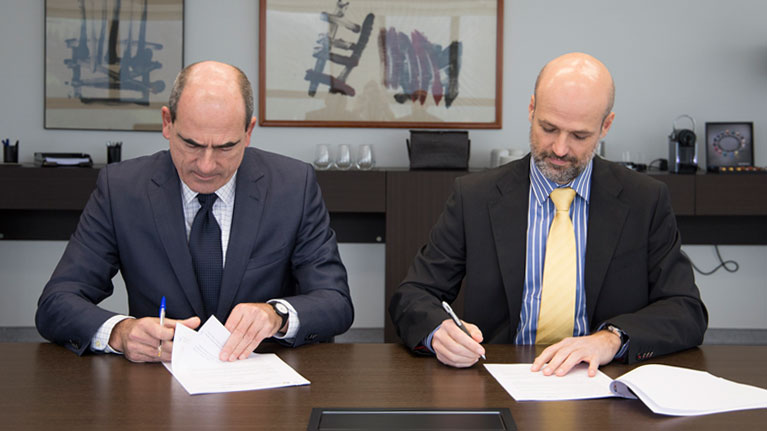CENER and IK4-TEKNIKER renew their partnership
Both organisations have signed a new collaboration agreement to further develop and apply technologies in the field of renewables.

The National Centre for Renewables (CENER) and the Basque technology centre IK4-TEKNIKER have signed a collaboration agreement this week to launch projects together whose aim is focused on researching and developing advanced technologies in the field of renewable energy, although with a special emphasis on thermoelectric solar power.
The agreement, signed at the Basque technology centre’s headquarters by the Managing Director of IK4-TEKNIKER, Alejandro Bengoa, and his counterpart at CENER, Pablo Ayesa, meant that the commitment established in 2009 was to be renewed for another five years.
Although the main priority of the new alliance is centred on research work connected to solar power, other renewables and energy storage options will also be explored.
During the lifetime of the agreement, both organisations will further R&D actions and also apply, among other things, nanotechnology, mechatronics and solar power systems initiated in 2009.
In fact, both organisations have specifically focused their collaboration on the characterisation and automatic calibration of solar collectors and the development of new thermo solar plant concepts and mechatronic systems (mechanics and accuracy control) for solar concentration systems.
“The spirit of the previous agreement still prevails today. The know-how and capabilities of both organisations are very synergistic and should allow us to make new technological developments”, remarked Bengoa after signing the agreement.
In addition, the agreement underscores a commitment in terms of furthering collaborative actions to carry out research, development and demonstration projects and also provide third party technological services characterised by a high degree of innovation and extensive technological development options.
“It is necessary to develop a shared strategy that goes beyond private interests to maintain and improve the leadership of companies and research centres working with these technologies”, added Pablo Ayesa, the Managing Director of CENER.
An alliance with tangible results
The nature of the collaborative work carried out by IK4-TEKNIKER and CENER in recent years has been associated with a number of outstanding achievements such as the development of small-size heliostats and central receptor systems capable of operating at higher temperature settings or new CSP plant configurations based on spherical Fresnel concentrators.
More specifically, both organisations have been involved in the EASY project that has made it possible to develop a new concept of a low-cost heliostat that is easy to industrialise. Thanks to this solution, patents have been filed jointly and partial funding has secured under European projects such as STAGE-STE (7th FP of the EU).
Together, they also launched the CAPTURE initiative (EU H2020) focused on developing an innovative concept based on decoupled multi-stack combined cycle thermosolar plants that deliver more efficiency.
Within the scope of this project, both CENER and IK4-TEKNIKER have developed the critical elements required for a system that is capable of feeding a combined cycle gas turbine by means of concentrated solar power.
Another outstanding achievement that has resulted from the collaboration between both organisations is the MOSAIC project (EU H2020) whose ultimate goal is to configure a thermoelectric solar power plant that uses multi-sphere concentrator know-how.
EurosunMed (7th FP of the EU) must also be underscored. It is an initiative focused on developing technology to obtain solar concentration and photovoltaic power to be fed into electrical grids.
This project addresses other issues such as tests involving innovative components and the setting up of collaborative networks between the EU, Egypt and Morocco to foster an exchange of students and engineers and disseminate the project’s end results.
The agreement between IK4-TEKNIKER and CENER has made it possible to file four joint patents focused on developing new solar receptors and collectors and improving and simplifying calibration and characterization processes involving large solar power fields.
Many papers have also been jointly published supported by lectures given at major events and conferences.
